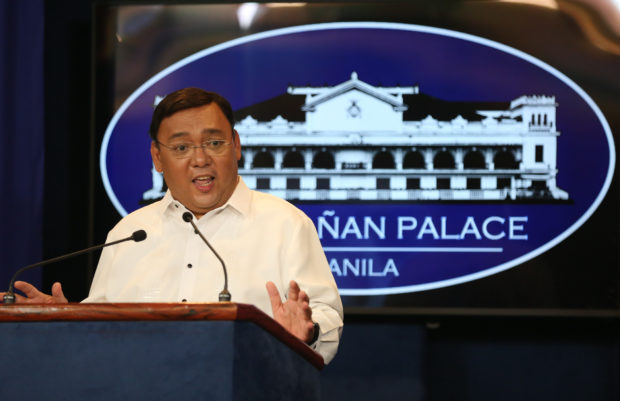Amid complaints of surging prices, President Rodrigo Duterte has ordered the Department of Labor and Employment (Dole) to convene regional wage boards in the hope of cushioning the impact of a weakening peso and higher taxes.
Presidential spokesperson Harry Roque said the call to convene the wage boards was one of the three measures aimed at mitigating the effects of the Tax Reform for Acceleration and Inclusion (TRAIN) Act and the depreciation of the peso against a resurgent US dollar.
“The President is not numb to what is happening, and no one likes that pump prices are this high. He has now issued three marching orders for this,” Roque said in an interview over dzMM.
Arrest profiteers
The first directive is for the Department of Trade and Industry (DTI) to monitor prices of basic goods and to arrest traders taking advantage of the rise in oil prices.
The DTI’s surveillance team, Roque said, has been activated to go after profiteers and close down their establishments.
“The DTI will monitor and really arrest businessmen violating the suggested retail price. Many are taking advantage of the high prices of goods. I think 70 percent of those taking advantage are businessmen,” he said.
Second, the Dole was tasked to determine if there is a need to increase the minimum wages of workers, amid the skyrocketing prices of basic goods. “[Labor] Secretary [Silvestre] Bello instructed the regional wage boards to convene and check if the minimum wages should be increased,” Roque said.
“We know that prices of basic goods are high, so there might be a need for higher wages,” Roque added, clarifying that wage hikes can only be done at the regional and not the national level.
The President’s third directive was for the Department of Energy (DOE) to look for cheaper sources of petroleum products from countries that are not members of the Organization of the Petroleum Exporting Countries (Opec).
Looking for cheaper oil
“The DOE is working to look for cheaper oil from non-Opec members like Russia. We will do everything to be able to import cheaper petroleum, because not all oil producers are members of the Opec,” Roque said.
He said the government was looking at importing diesel first from Russia, which on Friday announced that it would increase production.
Roque explained that since the TRAIN law already provided for the suspension of higher excise taxes on fuel products should oil reach the price of $80 a barrel, there was no need for the President to make an executive issuance to activate safety nets.
Nearing the threshold
Sen. Ralph Recto said the government would have no choice but suspend fuel excise taxes if the price of crude oil hit $80 per barrel, but that the Department of Finance would have to find funding for key government spending plans.
He said the revenues from the TRAIN law had been allocated for the increase in the policemen and soldiers’ salaries and for the free college education program this year.
At the same time, Sen. Joseph Victor Ejercito said the government should also consider that the prices of goods were rising faster than expected, with inflation reaching a five-year high of 4.5 percent in April.
